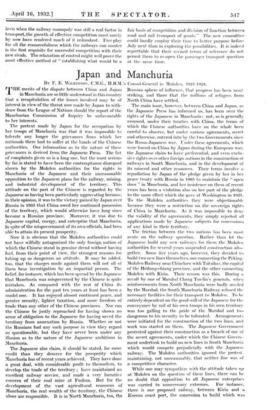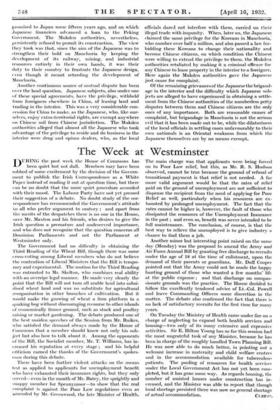Japan and Manchuria
s Consul-General in Mukden, 1921-1928,
- in Manchuria arc so little understood in this country that a recapitulation of the issues involved may be of interest in view of the threat now made by Japan to with- draw from the League of Nations should the report of the Manchurian Commission of Inquiry be unfavourable to her interests.
The pretext made by Japan for the occupation by her troops of Manchuria was that it was impossible to 'tolerate any longer the grievances from which her nationals there had to suffer at the hands of the Chinese authorities. Our information as to the nature of these grievances is derived from the Japanese Press. The list Of complaints given us is a long one, but the most Serious by far is 'stated to have been the contemptuous disregard shown by the Mukden authorities for the rights in Manchuria of the Japanese and their unreasonable opposition to the Japanese plans for the railway, mining, and industrial development of the territory. This attitude on the part of the Chinese is regarded by the Japanese as having been particularly aggravating because, in their opinion, it was to the victory gained by Japan over Russia in 1905 that China owed her continued possession of the territory, which would otherwise have long since become a Russian province. Moreover, it was due to Japanese capital, energy, and enterprise that Manchuria, in spite of the misgovernment of its own Officials, had been able to attain its present prosperity.
Now it is obvious that the Mukden authorities could not have wilfully antagonized the only foreign nation of which the Chinese stand in genuine dread without having had, from their point of view, the strongest reasons for taking up so dangerous an attitude. It may be added, too, that the charges made against them will not all of them bear investigation by an impartial person. The belief, for instance, which has been spread by the Japanese that Manchuria was misgoverned by the Chinese is quite mistaken. As compared with the rest of China its administration for the past ten years at least has been a model One. It has enjoyed almost continued peace, and greater security, lighter taxation, and more freedom of trade than any other of the Chinese provinces. Nor can the Chinese be justly reproached for having shown no sense of obligation to the Japanese for having saved the territory from annexation by Russia. Whether or not the Russians had any such purpose in view they regard as questionable, but they have never been under any illusion as to the nature of the Japanese ambitions in Manchuria.
The Japanese also claim, it should be stated, far more credit than they deserve for the prosperity which tanehuria has of recent years achieved. They have done a great deal, with considerable profit to themselves, to develop the trade of the territory ; have maintained an excellent railway service, and made a very lucrative concern of their coal mine at Fushun. But for the development of the vast agricultural resources of Manchuria, the real wealth of the territory, the Chinese alone are responsible. It is in North Manchuria, too, the Russian sphere of influence, that progress has been most striking, and there that the millions of refugees from North China have settled. -
The main issue, however, between China and Japan, as the Japanese Press has informed its,. has been over the rights of the Japanese in Manchuria: not, as is generally assumed, under their treaties with China, the terms of which the Chinese authorities have on the whole been careful to observe, but under various agreements, secret and otherwise, entered into by the two Governments since the Russo-Japanese war. Under these agreements, which were forced on China by Japan during the European war, the Japanese claim to have preferential, and even exclu- sive rights over other foreign nations in the construction ot railways in South Manchuria, and in the development of its mineral and other resources. Their terms involve it repudiation by Japan of the pledge given by her in her peace treaty with Russia in 1905 to maintain the " open door " in Manchuria, and her insistence on them of recent years has been a violation also on her part of the pledge to the same effect which she gave at Washington in 1921. To the Mukden authorities they were objectionable because they were a restriction on the sovereign rights of China in Manchuria. As it was impossible to deny the validity of the agreements, they simply rejected all applications made by Japanese subjects for concessions of any kind in their territory.
The friction between the two nations has been Most acute on the railway question. Rat her than let the Japanese build any new railways for them the Mukden authorities for several years suspended construction alto- gether. Some five years ago, however, they decided to build two new lines themselves, one connecting the Peking- Mukden Railway near Chinchow with Tsitsihar, the capital of the Heilung-chiang province, and the other connecting Mukden with Kirin. Their reason was this. During a revolt by one of Marshal Chang Tso-lin's generals, when reinforcements from North Manchuria were badly needed by the Marshal, the South Manchuria Railway refused the necessary facilities for their transport to Mukden. To be entirely dependent on the good-will of the Japanese for the conveyance by rail of his own troops in his own territory was too galling to the pride of the Marshal and too dangerous to his security to be tolerated. Arrangements were initiated for the construction of the two lines, and work was started on them. The Japanese Government protested against their construction as a breach of one of the secret agreements, under which the Chinese Govern- ment undertook to build no new lines in South Manchuria which would compete prejudicially with the Japanese railway. The Mukden authorities ignored the protest. maintaining, not unreasonably, that neither line was of a competitive character.
While one may sympathize with the attitude taken up at Mukden on the question of these lines, there can be no doubt that opposition to all Japanese enterprises was carried to unnecessary extremes. For instance, there is one proposed railway, between Kirin and a Korean coast port, the concession to build which was
promised to Japan some fifteen years ago, and on which Japanese financiers advanced a loan to the Peking 1:overmirent. The Mukden authorities, nevertheless; persistently refused to permit its construction. The view they took was that, since the aim of the Japanese was to strengthen their hold on Manchuria by keeping the development of its railway, mining, and industrial resources entirely in their own hands, it was their duty to their country to frustrate the Japanese design; even though it meant retarding the development of Manchuria.
Another continuous source of mutual dispute has been over the land question. Japanese subjects, also under one of these special agreements, have the privilege, withheld from foreigners elsewhere in China, of leasing land and trading in the interior. This was a very considerable con, cession for China to make, as the Japanese, who, like our- selves, enjoy extra,territorial rights, are exempt anywhere on Chinese soil from Chinese jurisdiction. The Mukden authorities alleged that almost all the Japanese who took advantage of the privilege to reside and do business in the interior were drug and opium dealers, who, as the local officials dared not interfere with them, carried on their illegal trade with impunity. When, later on, the Japanese claimed the same privilege for the Koreans in Manchuria; who number over half a million, and also passed a law for- bidding these Koreans to change their nationality and become Chinese citizens, on which condition the Chinese were willing to extend the privilege to -them, the Mukden authorities retaliated by making it a criminal-Offence for any Chinese to lease property in the interior-to a foreigner. Here again the Mukden authorities gave the Japanese just cause for complaint.
Of the remaining grievances of the Japanese the brigand- age in the interior and the difficulty which Japanese sub- jects are alleged to have experienced in obtaining a settle- ment from the Chinese authorities of the numberless petty disputes between them and Chinese citizens are the only ones of any importance. Both are reasonable causes of complaint, but brigandage in Manchuria is not the serious evil that it has been made out to be, while the dilatoriness of the local officials in settling cases unfavourably to their own nationals is an Oriental weakness from which the Japanese themselves are by no means exempt.









































 Previous page
Previous page